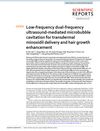 96 citations,
September 2008 in “Seminars in Cutaneous Medicine and Surgery”
96 citations,
September 2008 in “Seminars in Cutaneous Medicine and Surgery” Hormonal treatments, including birth control and antiandrogens, can effectively treat acne in women.
 60 citations,
September 2013 in “Alimentary Pharmacology & Therapeutics”
60 citations,
September 2013 in “Alimentary Pharmacology & Therapeutics” Immunosuppressive and anti-TNF therapies in IBD patients can increase the risk of skin cancer and cause various skin issues.
 51 citations,
June 2021 in “Signal Transduction and Targeted Therapy”
51 citations,
June 2021 in “Signal Transduction and Targeted Therapy” The document concludes that while there are promising methods to control CRISPR/Cas9 gene editing, more research is needed to overcome challenges related to safety and effectiveness for clinical use.
 39 citations,
February 2021 in “Journal of The American Academy of Dermatology”
39 citations,
February 2021 in “Journal of The American Academy of Dermatology” Low-dose oral minoxidil safely treats hair loss, with hypertrichosis as main side effect.
 31 citations,
September 2006 in “International journal of gynaecology and obstetrics”
31 citations,
September 2006 in “International journal of gynaecology and obstetrics” New treatments for PCOS focus on insulin resistance and reducing testosterone levels, along with traditional hormone therapies.
 31 citations,
September 2006 in “The Journal of Clinical Endocrinology & Metabolism”
31 citations,
September 2006 in “The Journal of Clinical Endocrinology & Metabolism” Testosterone therapy may slightly improve sexual function in postmenopausal women, but its long-term safety is unknown.
 29 citations,
December 2017 in “Molecular therapy”
29 citations,
December 2017 in “Molecular therapy” Enzyme replacement therapy improved multiple symptoms of homocystinuria in mice.
 24 citations,
July 2019 in “Journal of Obstetrics and Gynaecology”
24 citations,
July 2019 in “Journal of Obstetrics and Gynaecology” The combination therapy improved PCOS symptoms in both obese and non-obese women, with weight loss in the obese group.
 24 citations,
January 2001 in “Dermatologic clinics”
24 citations,
January 2001 in “Dermatologic clinics” Hormonal therapy is a treatment option for acne, the only medical treatment for hirsutism, and the most promising for androgenetic alopecia.
 24 citations,
March 1995 in “British Journal of Dermatology”
24 citations,
March 1995 in “British Journal of Dermatology” Etretinate therapy can cause hair loss by disrupting the hair growth cycle.
 21 citations,
February 2015 in “Journal of Feline Medicine and Surgery”
21 citations,
February 2015 in “Journal of Feline Medicine and Surgery” Negative pressure wound therapy is effective for skin grafts in cats.
 21 citations,
May 1989 in “Advanced Drug Delivery Reviews”
21 citations,
May 1989 in “Advanced Drug Delivery Reviews” Liposomes show promise in cancer treatment by delivering drugs with less toxicity and improved effectiveness.
 20 citations,
January 2000 in “Dermatologic Clinics”
20 citations,
January 2000 in “Dermatologic Clinics” New psoriasis treatments are effective but come with side effects and risks.
 20 citations,
November 1987 in “Archives of Dermatology”
20 citations,
November 1987 in “Archives of Dermatology” The document concludes that topical minoxidil therapy is safe and effective in promoting hair growth for male pattern baldness.
 19 citations,
May 2020 in “Journal of The American Academy of Dermatology”
19 citations,
May 2020 in “Journal of The American Academy of Dermatology” Low-dose oral minoxidil improves hair growth in male hair loss.
 19 citations,
October 2008 in “Journal der Deutschen Dermatologischen Gesellschaft”
19 citations,
October 2008 in “Journal der Deutschen Dermatologischen Gesellschaft” Anti-cancer treatments can cause reversible hair loss, skin sensitivity, pigmentation changes, nail damage, and skin reactions, with a need for more research on managing these side effects.
 18 citations,
September 2018 in “Experimental physiology”
18 citations,
September 2018 in “Experimental physiology” Electro-acupuncture may help treat PCOS in rats by changing brain DNA methylation.
 17 citations,
July 2014 in “Expert Opinion on Biological Therapy”
17 citations,
July 2014 in “Expert Opinion on Biological Therapy” The new method for isolating stem cells from fat is simple and effective, producing cells that grow faster and are better for hair regeneration.
 14 citations,
March 2020 in “Scientific Reports”
14 citations,
March 2020 in “Scientific Reports” Using dual-frequency ultrasound with microbubbles can potentially improve the delivery of hair growth treatment through the skin and enhance hair growth.
 13 citations,
January 2021 in “RSC chemical biology”
13 citations,
January 2021 in “RSC chemical biology” Wnt activation shows promise for regenerative medicine but requires selective targeting to minimize risks like cancer.
 10 citations,
May 2020 in “Dermatology Research and Practice”
10 citations,
May 2020 in “Dermatology Research and Practice” Proteoglycans are important for hair growth, and a specific treatment can help reduce hair loss.
 9 citations,
September 2009 in “The Prostate”
9 citations,
September 2009 in “The Prostate” Finasteride doesn't improve survival in LNCaP tumor model during off-cycle of therapy.
 8 citations,
May 1987 in “Journal of The American Academy of Dermatology”
8 citations,
May 1987 in “Journal of The American Academy of Dermatology” UV light does not significantly affect minoxidil's ability to treat male pattern baldness.
 7 citations,
June 2021 in “Trends in Food Science and Technology”
7 citations,
June 2021 in “Trends in Food Science and Technology” Western diet may cause male pattern baldness; low glycemic diet with magnesium could help.
 7 citations,
December 2020 in “Clinics in Dermatology”
7 citations,
December 2020 in “Clinics in Dermatology” Some alopecia treatments might help treat COVID-19, but more research is needed.
 7 citations,
July 2019 in “Scientific Reports”
7 citations,
July 2019 in “Scientific Reports” Finasteride helps reduce heart enlargement in heart failure patients.
 7 citations,
May 2016 in “SpringerPlus”
7 citations,
May 2016 in “SpringerPlus” Some breast cancer patients on hormone therapy experience hair loss, and treatments like certain topical inhibitors and supplements may help without harming their cancer prognosis.
 3 citations,
January 2016 in “Journal of cosmetology & trichology”
3 citations,
January 2016 in “Journal of cosmetology & trichology” Taking vitamins, minerals, and amino acids can improve hair strength and quality in people with Monilethrix.
 1 citations,
April 2018 in “Journal of Investigative Dermatology”
1 citations,
April 2018 in “Journal of Investigative Dermatology” People respond differently to hair loss treatment with PRP because of individual differences in growth factors from platelets.
 July 2024 in “Journal of Dermatology Research Reviews & Reports”
July 2024 in “Journal of Dermatology Research Reviews & Reports” Stem cell therapy shows promise for treating hair loss by promoting hair growth.






























